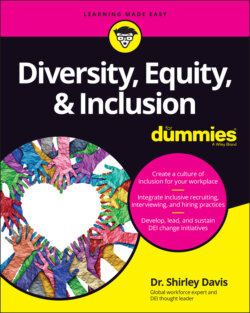Читать книгу Diversity, Equity & Inclusion For Dummies - Dr. Shirley Davis - Страница 12
Re-Shifting the Focus to Diversity, Equity, and Inclusion Work
ОглавлениеI write this book at a time when the world is facing some of the most unprecedented and disruptive events in modern history. Throughout 2020 and 2021, life as the world knew it changed dramatically because of the COVID-19 global pandemic. In early 2020, in a matter of weeks and with little time to prepare, schools were forced to shut down, sending millions of kids home to learn entirely virtually. Businesses were required to close offices and send employees home to work; many companies went out of business permanently, leaving millions of people without a paycheck. All public modes of transportation, such as air travel, transit railway systems, taxis, and rideshares, experienced record-low ridership. And the list goes on. Daily life had been upended in ways that were unexpected and unlike anything people had ever experienced.
You may ask “What does this global pandemic have to do with diversity, equity, and inclusion?”
A lot. Contrary to earlier assertions that COVID-19 was the great equalizer, it turned out to be the great revealer. It exposed and exacerbated longstanding and widespread disparities and inequities in healthcare, education, employment, and socioeconomics. Here are just a few examples:
When the world had to shelter in place and work from home, those most affected with job loss were essential workers (Black and brown people, and women) whose jobs couldn’t be performed remotely (for example, workers in restaurants and hotels, bus drivers, cleaning personnel, warehouse and manufacturing workers, and so on). And a lack of resources, such as Internet/Wi-Fi or a computer, had an adverse effect on others’ ability to work from home or for their children to learn virtually.
Caregiving responsibilities brought on by school and childcare closures and an increased need to care for sick and elderly family members fell mostly to women. Additionally, women were far more likely than men to be furloughed or terminated altogether.
Black and brown people were also some of the demographics hardest hit by the pandemic, with higher death rates due to disparities in access to healthcare and treatment.
Poverty levels rose significantly during the pandemic, exposing food shortages around the world. Nearly 1 billion people in the world went hungry in 2020, according to the UN report on the State of Food Security and Nutrition in the World.
While the global pandemic was devastating millions, another major event of 2020 that I believe will go down in the history books as a tipping point and defining moment in DEI work was the murder of George Floyd. The world watched this unarmed Black man in Minneapolis, Minnesota, being murdered at the hands (or in this case, the knee) of a white police officer on May 25, 2020. With much of the world under stay-at-home orders and able to watch the news coverage replay it over and over for weeks, the event sent shockwaves and launched protests reaching all seven continents.
For me and my DEI colleagues who have been in this work for a long time, we felt the sense of urgency like never before. It was as if we had been thrust to the front lines overnight. For years, we had been hoping for senior-level officers to place a greater focus/priority on DEI work because we observed too many companies becoming complacent; reverting to old ways and habits of being exclusionary and oppressive; and showing a blatant disregard for diversity, equity, and inclusion. We saw how divided and polarized the world was becoming, and our hearts were breaking while wondering whether the years of implementing DEI strategies were all in vain.
But nothing could’ve prepared us for how this re-shifting would happen. George Floyd’s murder, along with those of several other unarmed Black people that occurred just a few months earlier (such as Ahmaud Arbery and Breonna Taylor in February and March, respectively), received international news coverage. It changed our collective focus and raised the national consciousness to the racial inequalities, biases, and prejudices that have existed throughout history. Immediately following the murder of George Floyd, my firm and many others in DEI consulting were inundated with requests to consult with CEOs, presidents, and public relations and communications directors on crafting both public-facing and internal statements of commitment (and recommitment) to fighting injustices and inequities and creating cultures of inclusion and belonging.
My team and I conducted well over 100 listening sessions, focus groups, and staff town hall meetings within a ten-month period and administered countless inclusion and engagement surveys, DEI audits, and training programs on a range of topics such as DEI fundamentals, implicit bias, how to have courageous and impactful conversations, recruiting and building a diverse pipeline, building cultural competence, and cultivating cultures of inclusion and belonging. And for many of us, the demand hasn’t slowed down.
And I anticipate that it won’t, given the current and impending challenges we face. Leaders around the globe are grappling with the mental toll, the psychological trauma, and the stresses and fatigue felt by workers at all levels. And these effects from the COVID-19 pandemic, the exposed injustices and disparities, and the uncertainty of the economic recovery will be felt for years to come. Additionally, this book is timely and relevant (and, I would add, overdue) with the expected demographic shifts over the next decade, the complexities of working in a global marketplace, the continued advancements in technology that are redefining the way people work, the new kinds of skills that will be needed, and the ongoing war for top talent.
Re-shifting focus to diversity, equity, and inclusion work in times like these not only makes good business sense but also is necessary for creating a new and better world — one that recognizes humanity, celebrates diversity, and makes equity and inclusivity the reality. Diversity, equity, and inclusion should be a priority in every organization and a required responsibility of every leader.
